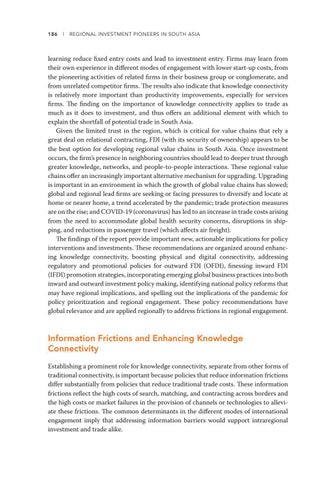186 l REGIONAL INVESTMENT PIONEERS IN SOUTH ASIA
learning reduce fixed entry costs and lead to investment entry. Firms may learn from their own experience in different modes of engagement with lower start-up costs, from the pioneering activities of related firms in their business group or conglomerate, and from unrelated competitor firms. The results also indicate that knowledge connectivity is relatively more important than productivity improvements, especially for services firms. The finding on the importance of knowledge connectivity applies to trade as much as it does to investment, and thus offers an additional element with which to explain the shortfall of potential trade in South Asia. Given the limited trust in the region, which is critical for value chains that rely a great deal on relational contracting, FDI (with its security of ownership) appears to be the best option for developing regional value chains in South Asia. Once investment occurs, the firm’s presence in neighboring countries should lead to deeper trust through greater knowledge, networks, and people-to-people interactions. These regional value chains offer an increasingly important alternative mechanism for upgrading. Upgrading is important in an environment in which the growth of global value chains has slowed; global and regional lead firms are seeking or facing pressures to diversify and locate at home or nearer home, a trend accelerated by the pandemic; trade protection measures are on the rise; and COVID-19 (coronavirus) has led to an increase in trade costs arising from the need to accommodate global health security concerns, disruptions in shipping, and reductions in passenger travel (which affects air freight). The findings of the report provide important new, actionable implications for policy interventions and investments. These recommendations are organized around enhancing knowledge connectivity, boosting physical and digital connectivity, addressing regulatory and promotional policies for outward FDI (OFDI), finessing inward FDI (IFDI) promotion strategies, incorporating emerging global business practices into both inward and outward investment policy making, identifying national policy reforms that may have regional implications, and spelling out the implications of the pandemic for policy prioritization and regional engagement. These policy recommendations have global relevance and are applied regionally to address frictions in regional engagement.
Information Frictions and Enhancing Knowledge Connectivity Establishing a prominent role for knowledge connectivity, separate from other forms of traditional connectivity, is important because policies that reduce information frictions differ substantially from policies that reduce traditional trade costs. These information frictions reflect the high costs of search, matching, and contracting across borders and the high costs or market failures in the provision of channels or technologies to alleviate these frictions. The common determinants in the different modes of international engagement imply that addressing information barriers would support intraregional investment and trade alike.

